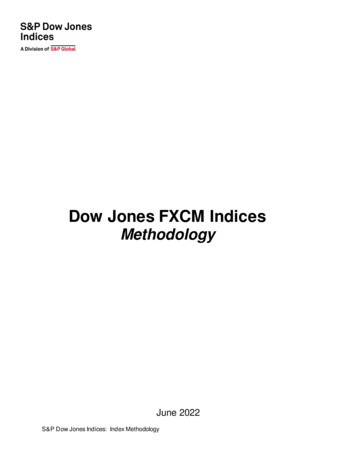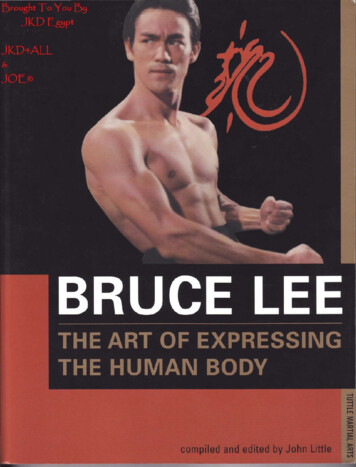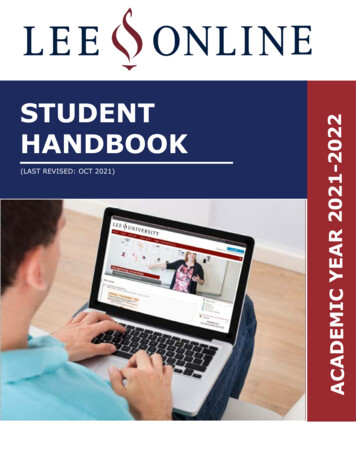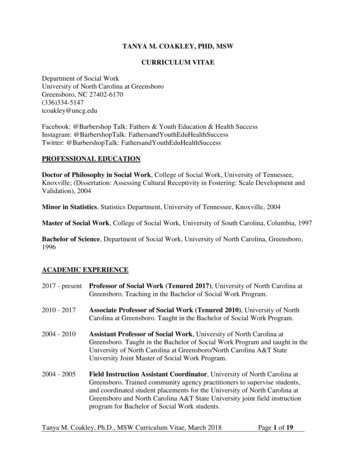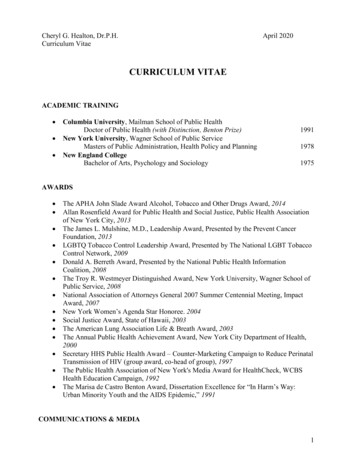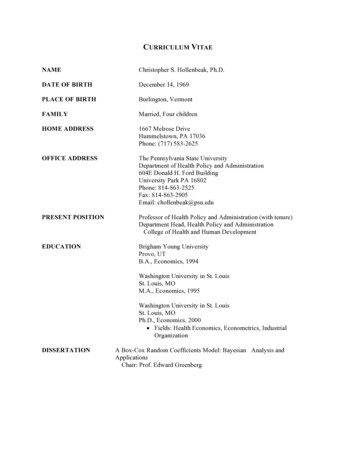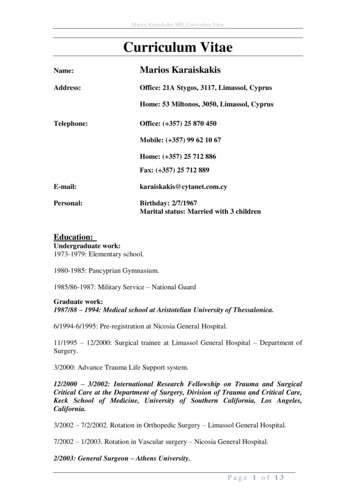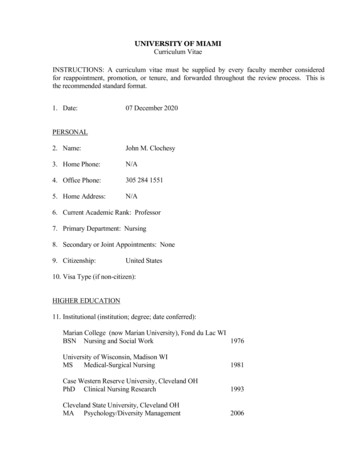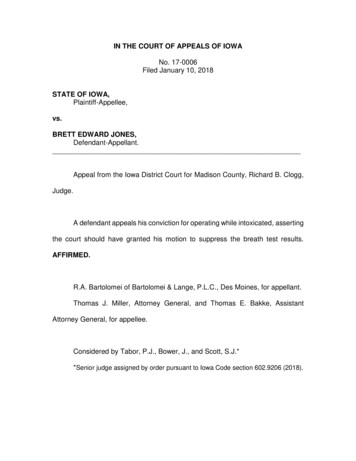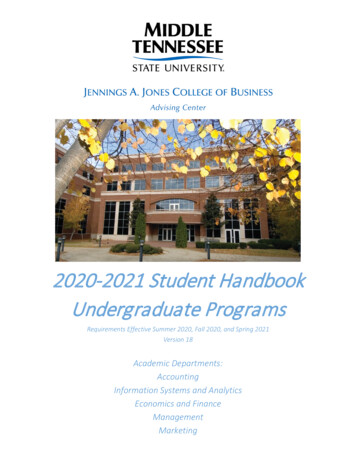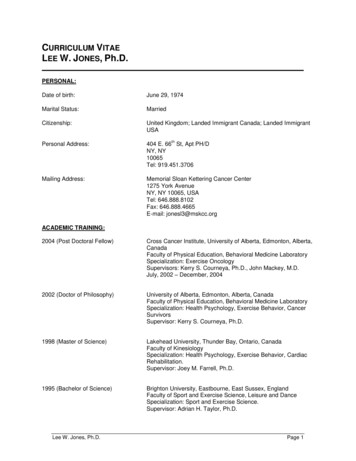
Transcription
CURRICULUM VITAELEE W. JONES, Ph.D.PERSONAL:Date of birth:June 29, 1974Marital Status:MarriedCitizenship:United Kingdom; Landed Immigrant Canada; Landed ImmigrantUSAPersonal Address:404 E. 66 St, Apt PH/DNY, NY10065Tel: 919.451.3706Mailing Address:Memorial Sloan Kettering Cancer Center1275 York AvenueNY, NY 10065, USATel: 646.888.8102Fax: 646.888.4665E-mail: jonesl3@mskcc.orgthACADEMIC TRAINING:2004 (Post Doctoral Fellow)Cross Cancer Institute, University of Alberta, Edmonton, Alberta,CanadaFaculty of Physical Education, Behavioral Medicine LaboratorySpecialization: Exercise OncologySupervisors: Kerry S. Courneya, Ph.D., John Mackey, M.D.July, 2002 – December, 20042002 (Doctor of Philosophy)University of Alberta, Edmonton, Alberta, CanadaFaculty of Physical Education, Behavioral Medicine LaboratorySpecialization: Health Psychology, Exercise Behavior, CancerSurvivorsSupervisor: Kerry S. Courneya, Ph.D.1998 (Master of Science)Lakehead University, Thunder Bay, Ontario, CanadaFaculty of KinesiologySpecialization: Health Psychology, Exercise Behavior, CardiacRehabilitation.Supervisor: Joey M. Farrell, Ph.D.1995 (Bachelor of Science)Brighton University, Eastbourne, East Sussex, EnglandFaculty of Sport and Exercise Science, Leisure and DanceSpecialization: Sport and Exercise Science.Supervisor: Adrian H. Taylor, Ph.D.Lee W. Jones, Ph.D.Page 1
APPOINTMENTS:February 01, 2014 to presentMember (Attending Physiologist), Director, Cardio-OncologyResearch Program, Department of Medicine, Memorial SloanKettering Cancer Center, New York, New York, USAJuly 01, 2009 to January 31, 2014Associate Professor, Scientific Director, Duke Center for CancerSurvivorship, Department of Radiation Oncology, Duke CancerInstitute, Durham, North Carolina, USAAugust 01, 2008 to June, 30, 2009Associate Professor, Director, Tug McGraw Research Center,The Preston Robert Tisch Brain Tumor Center at Duke,Department of Surgery, Division of Neuro-Oncology, DukeUniversity Medical Center, Durham, North Carolina, USAFebruary 01, 2006 to July 31, 2008Assistant Professor, Director, Tug McGraw Research Center,The Preston Robert Tisch Brain Tumor Center at Duke,Department of Surgery, Division of Neuro-Oncology, DukeUniversity Medical Center, Durham, North Carolina, USAJanuary 01, 2005 to January 31, 2006Assistant Professor, Department of Medicine, Division of MedicalOncology, Duke University Medical Center, Durham, NorthCarolina, USA.AWARDS/HONORS:1. The Journal of Clinical Oncology, Associate Editor, (2015 – 2018).2. Science on the Swan – Distinguished Visiting Research Award. Edith Cowan UniversityWestern Australia (2015).3. Distinguished Visiting Research Award. University of South Australia, Adelaide, Australia(2013).4. Comparative Effectiveness Research KM1 Mentor. National Institutes of Health, DukeUniversity Medical Center (2011-2013).5. Duke Pepper Scholar. Duke University Medical Center, Durham, NC (2011).6. Brain Korea 21 Scholar. University of Yonsei, Seoul, Korea (2011).7. The Lancet Oncology, International Advisory Board, (2010 – 2014)8. United States Department of Defense Breast Cancer Research Program of the Office of theCongressionally Directed Medical Research Programs—Multidisciplinary PostdoctoralFellowship. (2005-2008)(declined).9. Alberta Heritage Foundation for Medical Research Studentship. (2000 - 2002).10. Academic All-Canadian Award (1998-2001). Faculty of Graduate Studies, University of Alberta,Edmonton, Alberta, Canada.ADVISORY AND NATIONAL COMMITTEE MEMBERSHIPLee W. Jones, Ph.D.Page 2
1. The Journal of Clinical Oncology – Official Journal of the American Society of Clinical Oncology,Associate Editor (2015 – 2018).2. American Society of Clinical Oncology – American College of Cardiology. Cardio-OncologyWorking Group (2014 – present).3. American Society of Clinical Oncology. Energy Balance Work Group (2013 – present).4. American Society of Clinical Oncology. Cancer Survivorship Work Group (2013 – present).5. National Comprehensive Cancer Network (NCCN). NCCN Cardio-Oncology Panel (2013present).6. National Comprehensive Cancer Network (NCCN). NCCN Survivorship Panel (2012- present).7. German Cancer Aid, Advisory Committee (2011 – present)8. American Institute for Cancer Research (AICR). AICR Cancer Resource Advisory Committee(2011 - present).9. National Cancer Institute. Mechanisms of Accelerated Aging in Cancer Survivors Think TankthMeeting. Rockville, USA, September 25-27 , 2013.10. Diagnosis and Management of Lung Cancer: ACCP Evidence-Based Clinical Practice Guidelinerd(3 Edition) (2012).11. National Cancer Institute Clinical Community Oncology Program Think Tank Meeting. Non-TissuethBiomarkers in Clinical Oncology Trials. Rockville, USA, March 20 , 2012.12. The Lancet Oncology, International Advisory Board, (2010 – 2014)13. National Cancer Institute Think Tank Meeting. The Complex Patient: Biobehavioral Perspectivesthof Cancer and Cardiovascular Diseases as Comorbid Conditions. Park City, USA, July 13-14 ,2011.INVITED TALKS:1. Efficacy and Mechanisms of Exercise as Treatment of Cancer. Annual Meeting of the German,thAustrian and Swiss Associations for Hematology and Medical Oncology, Basel, October 9-13 ,2015.2. Exercise and Tumor Biology. Keynote Lecture. Akershus University Hospital, Oslo, Norway, Juneth10 , 2015.3. Exercise and Cancer: Epidemiological and Mechanistic Data. The ASCO Obesity Initiative: ThethWeight of the Evidence. 2015 ASCO Annual Meeting, Chicago, IL, USA, May 29 , 2015.4.5. Exercise Biology and Carcinogenesis. Keynote Lecture. Science on the Swan, Edith CowanthUniversity, Perth, Western Australia, Australia, April 19 , 2015.6. Cancer as a Model of Accelerated Physiological Aging and Protective Properties of ExercisethTraining. Medicine Grand Rounds. City of Hope, LA, California, USA, March 17 , 2015.7. Exercise as Treatment for Cancer: Ready for Prime Time? Southern Alberta Cancer ResearchthInstitute. Calgary, Alberta, Canada, March 6 , 2015.Lee W. Jones, Ph.D.Page 3
8. Exercise as Treatment for Cancer: A Translational Approach. Integrative Medicine GrandthRounds. MD Anderson Cancer Center, Houston, Texas, USA, February 17 , 2015.9. Exercise Therapy Following a Cancer Diagnosis. University of Florida, Gainesville, Florida, USA,thJanuary 28 , 2015.nd10. Exercise Treatment for Cardiovascular and Oncologic Outcomes. 2thSymposium. Sirio Libanes Hospital, Sao Paulo, Brazil, November 28 , 2014.Cardio-Oncology11. Exercise – the Magic Bullet in Cancer Control? Keynote Lecture. New England Chapter of thethAmerican College of Sports Medicine, Providence, Rhode Island, USA, November 14 , 2014.12. Looking Beyond Symptom Control: Exercise Training as Treatment for Cancer. The ObesitythSociety Annual General Meeting, Boston, Massachusetts, USA, November 6 , 201413. Running on Empty: Cardiovascular Late-Effects and Efficacy of Exercise Countermeasures in theOncology Setting. American Institute for Cancer Research Annual Research Conference,stWashington DC, USA, October 29-31 , 2014.14. Exercise as Treatment Following a Diagnosis of Lung Cancer. American College of ChestthPhysicians Annual CHEST Meeting. Austin, Texas, USA, October 27 , 201415. A Translational Approach to the Exercise – Cancer Link. American Association for CancerththResearch Annual Conference. New Orleans, Louisiana, USA, September 28 -29 , 2014.16. Exercise Training Interventions in Patients with Non-Small Cell Lung Cancer. EuropeanthRespiratory Society Annual Meeting, Munich, Germany, September 6-10 , 2014.17. Evidence-Based Exercise Prescription for Cancer Patients. The International 22thSymposium, Kuopio, Finland, June 24-28 , 2014.ndPuijo18. Exercise as Treatment for Cancer. Keynote. American College of Veterinary Internal MedicinethAnnual Conference. Nashville, USA, June 6 , 2014.19. The Application of the Principles of Exercise Physiology in the Oncology Setting. Keynote.thSociety of Thermal Medicine, Minneapolis, USA, May 7 , 2014.20. Interventions for Cancer Survivors for Improving Cardiovascular Health. Women’s Health InitiativestAnnual Meeting. Fred Hutchinson Cancer Research Center, Seattle, WA, USA, May 1 , 2014.21. Adopting a Precision Cancer Medicine Approach to Investigate the Efficacy of Exercise Therapyas Treatment for Cancer: Timely and Necessary. Medical Oncology Grand Rounds.thMassachusetts General Hospital, Boston, USA, April 30 , 2014.22. The Potential Benefits of Exercise Therapy for Patients with Malignant Glioma. Courage KennythRehabilitation Institute, Abbot Northwestern Hospital, Minneapolis, USA, April 7 , 2014.23. Can Exercise be used as Effective Treatment for Cancer? Keynote Lecture. Veterinary CancerthSociety / Veterinary Specialty of Surgical Oncology, Asheville, USA, March 16 , 2014.24. Exercise, Cancer Survivorship, and Cardiac Reserve. International Cardio-Oncology SocietythAnnual Meeting, Washington DC, USA, December 13 , 2013.25. Running on Empty: Cardiovascular Late-Effects and Efficacy of Exercise Countermeasures in thethOncology Setting. Grand Rounds, Liverpool Hospital, Sydney, Australia, November 18 , 2013.Lee W. Jones, Ph.D.Page 4
26. Cancer as a Model of Accelerated Aging and Mitigating Properties of Exercise Training. PlenarythLecture, 40 Annual Scientific Meeting of the Clinical Oncological Society of Australia, Adelaide,thAustralia, November 12-14 , 2013.27. Is 50 the new 70? Cancer as Model of Accelerated Physiological Aging. National Cancer InstituteMechanisms of Accelerated Aging in Cancer Survivors Think-Tank. Rockville, USA, Septemberth25-27 , 2013.th28. The Role of Exercise Therapy in Patients with Cancer. The Evidence. Keynote Lecture, 25International Sports Science Congress: In Pursuit of Evidence Based Sports and ExerciseScience, Korean Alliance for Health, Physical Education, Recreation, Seoul, South Korea, Augustth20 , 2013.29. Looking Beyond Symptom Control: Exercise Training as Treatment for Cancer. Keynote Lecture,thCancer Research Day, Odette Cancer Centre, Toronto, Canada, June 20 , 2013.st30. The Role of Exercise as a Prevention and Treatment Strategy for Cancer. Plenary Lecture, 1Annual Cancer Rehabilitation Symposium, Memorial Sloan-Kettering Cancer Center, New York,stUSA, June 1 , 2013.31. Exercise as Treatment for Cancer: A Translational Approach. Cancer Population Sciences GrandthRounds, MD Anderson Cancer Center, Houston, USA, April 30 , 2013.32. Exercise-Induced Modulation of Cytokine Availability to Alter Tumor Phenotypes. KeynotethLecture, 7 Annual Centre of Inflammation and Metabolism Symposium, Copenhagen, Denmark,thApril 15-20 , 2013.33. Exercise as Treatment for Cancer: A Translational Approach. 2013 Education Committee for theAnnual Meeting of the American Association for Cancer - Cancer Prognosis and Survivorship:thNovel Strategies and Results, Washington DC, USA, April 6 , 2013.34. Exercise Therapy as Treatment for Cardiovascular Late-Effects and Cancer in the OncologySetting: A Translational Approach. University of Illinois at Champaign, University of Illinois, USA,thMarch 29 , 2013.35. Exercise Therapy as Treatment for Cancer-Specific and Cardiovascular Causes of Mortality inCancer Survivors. The Ohio State University, Department of Medicine Grand Rounds, Columbus,thUSA, Feb 27 , 2013.36. Examining the Effects of Exercise Therapy as Treatment for Cancer: A Translational Approach.Plenary Lecture, Flinders Centre for Innovation in Cancer, Survivorship Conference, Adelaide,thAustralia, Feb 16 , 2013.37. Exercise Therapy in Cancer Survivorship: New Application of an Ancient Therapeutic Strategy.thBritish Columbia Cancer Agency, Grand Rounds, Vancouver, Canada, Jan 9 , 2013.38. Exercise Treatment for Cardiovascular and Oncologic Outcomes in the Oncology Setting. SouthEast American College of Sports Medicine Tour (Universities of Georgia, Miami, and Florida).rdthGrand Rounds, USA, Dec 3 – 5 , 2012.39. Exercise Physiology in Oncology: New Applications of an Ancient Therapeutic Strategy. MemorialSloan Kettering Cancer Center, Department of Medicine Grand Rounds, New York City, USA,thNov 30 , 2012.Lee W. Jones, Ph.D.Page 5
40. Exercise Treatment for Cardiovascular and Oncologic Outcomes in Cancer Survivors. CancerthPrevention and Control Grand Rounds, Roswell Park, Buffalo, USA, Nov 26 , 2012.41. Exercise Therapy as Treatment for Cardiovascular Late-Effects and Cancer in the OncologySetting: A Translational Approach. Vermont Cancer Center, Keynote Lecture, Vermont, USA, Novth17 , 2012.42. The Duke Cardio-Oncology Research Program. University of British Columbia – Okanagan,thKelowna, Canada, Nov 12 , 2012.43. Exercise Modulation of the Host-Tumor Interaction in Breast Cancer. Keynote Lecture, AlbertandCancer Board, Banff, Canada, Nov 2 , 2012.44. Exercise Rehabilitation for Patients with Cancer. Memorial Sloan Kettering Cancer Center,thDepartment of Rehabilitation Medicine Grand Rounds, New York City, USA, Oct 19 , 2012.45. Beyond Obesity: Energy Balance and Cancer Survivorship. American Dietetic Association AnnualthMeeting, Philadelphia, USA, Oct 8 , 2012.46. Pre-training Risk Assessment and Training Prescription for Cancer Patients. 100 Years ofthGerman Sports Medicine Centenary Congress, Berlin, Germany, Oct 4-6 , 2012.47. Prioritizing Exercise Therapy as an Integral Aspect of Cancer Rehabilitation: Rationale andSupporting Evidence. Danish Society for Psychosocial Medicine, Copenhagen, Denmark, Septth17-18 , 2012.th48. Exercise-Oncology Research: Current Status and Future Directions. 10 Acta OncologiaSymposium: European Cancer Rehabilitation and Survivorship Symposium, Copenhagen,thDenmark, Sept 17-18 , 2012.th49. Exercise Oncology Masterclass. The Netherlands Cancer Institute, Arnhem, Holland, July 16-17 ,2012.50. Methodological Considerations in Duke Exercise – Oncology Trials. The German Cancer AidthExercise-Oncology Symposium, Frankfurt, Germany, July 15 , 2012.th51. The Role of Exercise in Modulation of Chemotherapy-Induced Cardiotoxicity. 6 Biennial CancerthSurvivorship Research Conference, Arlington, USA, June 14 16 , 2012.52. Translational Research to Optimize the Efficacy of Exercise Therapy as Treatment for Cancer.thPlenary Lecture, 6 Biennial Cancer Survivorship Research Conference, Arlington, USA, Juneth14 16 , 2012.53. From Cells to Society: Exercise as Treatment for Cardiovascular Injury and Cancer ProgressionFollowing a Cancer Diagnosis. National Institutes of Health, Exercise Special Interest Group,thBethesda, USA, June 13 , 2012.54. Effects of Exercise Therapy on Cardiovascular and Tumor Outcomes Following a CancerDiagnosis: A Translational Approach, Oncology Rounds, Presbyterian Hospital, Charlotte, USA,thJune 6 , 2012.55. Utility of Non-Tissue Biomarkers in Clinical Oncology Trials. NCI-Sponsored Clinical CommunitythOncology Program Think Tank Meeting, NCI, Rockville, USA, March 20 , 2012.Lee W. Jones, Ph.D.Page 6
56. Exercise Therapy Following a Cancer Diagnosis: Cardiovascular and Tumor-Related Outcomes.thSt. Jude’s Children Hospital Grand Rounds, University of Memphis, Memphis, USA, March 15 ,2012.57. Role of Exercise in Cancer Rehabilitation and Survival. UCSF Cancer Grand Rounds, Universitythof California at San Francisco, San Francisco, USA, Feb 27 , 2012.58. Exercise Therapy at the Intersection of Cardiovascular and Tumor Outcomes Following a CancerDiagnosis. Scientific Symposium, Duke Cancer Institute: Contemporary Discoveries and FuturethPromise. Duke University Medical Center, Durham, USA, Feb 25 , 2012.59. Quantitative Functional Capacity Testing and Role of Exercise Interventions in Clinical Oncology.stEisai Investigator Meeting, New York, USA, Jan 21 , 2012.60. The Role of Exercise Therapy in Cancer Patients: Cardiovascular Outcomes and Mechanisms ofAction. Plenary Session, Association of Danish Physiotherapists, Copenhagen, Denmark, Dec, 5th6 , 2011.61. The Role of Exercise Therapy Following a Cancer Diagnosis. School of Health, PhysicalthEducation, and Recreation, Indiana University, USA, Nov 20 , 2011.62. Defined Targeted Aerobic Training at the Intersection of the Host – Tumor Interaction. OncologythGrand Rounds, University of New Brunswick, Canada, Nov 6 , 2011.63. Role of Exercise in Cancer Rehabilitation and Survival: American Institute for Cancer ResearchthAnnual Research Conference. Washington DC, USA, Nov 3-4 , 2011.64. Exercise Training in Patients with Non-Small Cell Lung Cancer. CSEP 2011: Canadian Society ofthExercise Physiology, Quebec City, Canada, October 20 , 2011.65. The Role of Exercise Therapy on Cardiovascular and Tumor-Related Outcomes Following aCancer Diagnosis. Cooper Institute, University of Texas South Western, Dallas, USA, Octoberth14 , 2011.66. Cardiorespiratory Fitness Testing in Oncology: Rationale, Methodology, and Clinical Importance.thPlenary Session, A-CaRe Annual Meeting. Amsterdam, The Netherlands, Sept, 25 , 2011.67. Role of Exercise Therapy in Neuro-Oncology. Plenary Session, 10thNeuro-Oncology Update. Nashville, USA, September 15 , 2011thAnniversary International68. Defined Targeted Aerobic Training at the Intersection of the Host – Tumor Interaction. MedicalthOncology Grand Rounds, Dundee University, Scotland, August 16 , 2011.69. Exercise Therapy and Cancer Survivorship: The Duke Experience. Center for Physical Activitythand Health Promotion, Strathclyde University, Scotland, August 15 , 2011.70. The Duke Exercise – Oncology Research Program. BK Scholar Lecture Series, YonseithUniversity, South Korea, May 4-7 , 2011.71. Physical Activity for Cancer Survivors. Cancer Survivorship: Bridging the Transition to Life AfterthCancer Treatment. University of Minnesota, USA, April 30 , 2011.72. Exercise, Cardiovascular, and Oncologic Outcomes in Cancer Patients. Comprehensive CancerthCenter, Wake Forest University, USA, March 24 , 2011.Lee W. Jones, Ph.D.Page 7
73. Exercise at the Nexus of the Host – Tumor Interaction. Cancer Control & Population SciencesthProgram, University of Alabama, Birmingham, USA, January 18 , 2011.74. Exercise Therapy Following a Diagnosis of Primary Malignant Glioma. Society of NeurothOncology, Montreal, Canada, November 17 , 2010.75. Exercise Therapy and Exploitation of the Warburg Effect in Solid Tumor Metabolism. CSEP 2010:thCanadian Society of Exercise Physiology, Toronto, Canada, November 4 , 2010.76. Evidence-Based Physical Activity Guidelines: Cancer CSEP 2010: Canadian Society of ExercisethPhysiology, Toronto, Canada, November 4 , 2010.77. Effects of Aerobic Training to Improve Cardiovascular Function and Prevent Cardiac RemodelingAfter Cytotoxic Therapy in Early Breast Cancer. First International Conference on Cancer and therdHeart, MD Anderson Cancer Center, Houston, USA, Nov 3 , 2010.78. Exercise Therapy at the Nexus of Cardiovascular and Oncologic Outcomes Following a CancerDiagnosis. Cancer Control & Population Sciences Program, University of Alabama, Birmingham,thUSA, October 28 , 2010.79. Exercise Benefits both Cancer and Heart Disease. IV Annual International Symposium, Nashville,thUSA, October 7-9 , 2010.80. Exercise-Based Rehabilitation Following a Diagnosis of Non-Small Cell Lung Cancer. PlenaryththSession, 6 Biennial Cancer Survivorship Research Conference, Bethesda, USA, June 17 ,2010.81. Exercise Therapy at the Intersection of Cardiovascular and Oncologic Outcomes Following athBreast Cancer Diagnosis. Novartis Global Oncology Educational Series, Durham, USA, April 17 ,2010.82. Survival of the Fittest in Cancer Prevention and Prognosis. American Society of PreventivestOncology, Bethesda, USA, March 21 , 2010.83. Exercise Therapy in Cancer: A Simple Intervention with Complex Implications. Division of CancerthPrevention Grand Rounds, MD Anderson Cancer Center, Houston, USA, March 14 , 2010.84. Exercise Therapy for the Prevention and Treatment of Cancer. Texas Chapter of the AmericanthCollege of Sports Medicine, University of Texas, Houston, USA, March 14 , 2010.85. What All Oncology Professionals Should Know About Exercise But Were Afraid to Ask!. KeythNote Lecture, Vancouver Island Oncology Conference, Victoria, Canada, November 20 , 2009.86. Advanced Learning for Clinical Exercise Rehabilitation in Patients with Cancer. CSEP 2009:thCanadian Society of Exercise Physiology, Vancouver, Canada, November 15 , 2009.87. Evidence-Based Risk Assessment for Physical Activity Clearance: Cancer. Canadian Society ofthExercise Physiology, Vancouver, Canada, November 14 , 2009.88. The Anti-Cancer Exercise Program. The Fifth Annual Upstate Cancer Symposium, Syracuse,USA, October 16, 2009.89. Cardiovascular Late Effects in Cancer. National Cancer Institute and Transdisciplinary Researchon Energetics and Cancer, Seattle, USA, October 8, 2009.Lee W. Jones, Ph.D.Page 8
90. Cardiotoxicity of Novel Cancer Agents. Sanofi Annual Cardiotoxicity Review Panel, Vancouver,Canada, June 13, 2009.91. Exercise and Prognosis After a Cancer Diagnosis. Exercise and Cancer InternationalSymposium, Zentrum fur Pravention und Sportmedizin, Munich, Germany, November 20, 2008.92. Exercise and Cancer Prognosis: ‘We’ve Only Just Begun.’ Canadian Speaker Series, Winnipeg,Calgary, Edmonton, Vancouver, Canada, Oct 26 – 30, 2008.93. Exercise Therapy for Persons Diagnosed with Cancer: Urology Grand Rounds, Duke UniversityMedical Center, Durham, USA, July 30, 2008.94. Operable Breast Cancer and Cardiovascular Injury: The Potential Role for Aerobic ExerciseTraining. American Society of Preventive Oncology, Bethesda, USA, March 17, 2008.95. Exercise Therapy for Patients with Cancer: The Duke Exercise Oncology Program. Henry FordCancer Center, Detroit, USA, December 7, 2007.nd96. Exercise and Survival After Colorectal Diagnosis. 2Cancer, Mexico City, Mexico, November 24, 2007.National Meeting on Gastrointestinal97. Cardiovascular Consequences of Breast Cancer Therapy: The Potential Role of Exercise.Northern Alberta Breast Cancer Program, Jasper, Canada, September 8, 2006.98. Exercise Therapy for Patients with Breast Cancer. Post San Antonio CME, Pinehurst, USA,March 4, 2005.99. Exercise Oncology at the Cross Cancer Institute: The Beginning, Not the End. Cross CancerInstitute ‘Grand Rounds’, Edmonton, Canada, December 14, 2004.100.Exercise Therapy for Patients with Cancer. Cachexia in Cancer and Aging Conference,Chicago, USA, December 5, 2004.101. Nutrition and Physical Activity During and After Cancer Treatment: Evidence for InformedDecision Making. Oncology Nursing Society, Anaheim, USA, April 29-May 2, 2004.102. A Randomized Trial of Exercise in Postmenopausal Breast Cancer Survivors. National CancerInstitute of Canada - Clinical Trials Group, Toronto, Canada, April 17, 2004.103. Exercise as Part of Multidisciplinary Care for Patients with Cancer. Duke University MedicalCenter, Durham, USA, March 25-27, 2004.104. Exercise and Cardiovascular Health, A Heart of the Matter-II. Maanaw Seva Association,Edmonton, Canada, March 13, 2004.105. Cardiopulmonary Effects of Cancer Treatment. Canadian Cancer Rehabilitation Conference,McMaster University, Quebec City, Canada, May 28-30, 2004.106. Exercise and Cancer Rehabilitation. Visiting Professor Series, McGill University, Department ofOncology, Montreal, Quebec, Canada, October 8-11, 2003.RESEARCH SUMMARYRESEARCH GRANT INFORMATIONSubmitted / Pending GrantsLee W. Jones, Ph.D.Page 9
GrantSubmitted toTerm/AmountGrantPhase III trial of optimal type of exercisein postsurgical lung cancerFunded byNational Institutes of Health– R01 (CA138624), LeeJones, PITerm/Amount2009-2016( 360,000/yr)2.Randomized trial of optimal intensity ofaerobic training in breast cancerNational Institutes of Health– R01 (CA142566), LeeJones, PI2010-2016( 400,000/yr)3.Phase II study of exercise training incombination with standard chemotherapyas treatment for metastatic breast cancerNational Institutes of Health– R21 (CA133895), LeeJones, PI2011-2015( 133,000/yr)4.Exercise and metformin to impacthyperinsulinemia in colorectal cancersurvivorsNational Institutes of Health,Transdisciplinary Researchin Energy Balance andCancer – U54-CA155626,Jeffrey Meyerhardt (DanaFarber Cancer Institute), PI;Lee Jones, PI (Duke, Subcontract)2011-2016( 300,000/yr)5.Aerobic training during or after adjuvanttherapy: A randomized trialNational Institutes of Health– R01 (CA164751), LeeJones, PI2012 – 2017( 465,000/yr)6.Dose and mechanisms of exercise inbreast cancer preventionNational Institutes of Health– R01 (PQ5, CA179992),Lee Jones, PI2014 – 2018( 490,000/yr)7.Effects of exercise training on prostategenomic signatures of recurrenceNational Institutes of Health– R01, June Chan, PI(University of California –San Francisco), PI; LeeJones, PI (Duke, Subcontract)2014 – 2019( 490,000/yr)8.Safety and efficacy of exercise training inmen receiving enzalutamide incombination with conventional androgendeprivation therapy for hormone naïveprostate cancer: A phase II multicenterRCTMedivation / Astellas, Inc. –Lee Jones, Co-PI2014 – 2016( 250,000/yr)9.Periprostatic adipose inflammation: Atargetable mediator of prostate cancerprogressionProstate Cancer Foundation–Andy Danneberg, PI2015 – 2017( 500,000/yr)10.Quantification and clinical importance ofquantitative functional performance inBeatrice and Samuel A.Seaver Foundation2015 – 2016( 50,000/yr)1.Active Grants1.Lee W. Jones, Ph.D.Page 10
Grantolder patients undergoing hematopoieticcell transplantation for acute myeloidleukemiaFunded by– Lee Jones, Co-PITerm/AmountMechanistic studies to elucidatemechanisms underlying the exercise –cancer relationshipAKTIV Against CancerFoundation– Lee Jones, PI2015 – 2017( 400,000/yr)GrantChanges in endurance and skeletalmuscle function in newly diagnosedprimary brain tumor patientsFunded byNational Cancer Institute –R03, 2 Years – Lee Jones,PITerm/Amount2007 – 2010( 74,000/yr)2.Effect of exercise training on tumorvascularity and response to neoadjuvanttherapy in operable breast cancerUnited States Department ofDefense Breast CancerResearch Program of theOffice of theCongressionallyDirected Medical ResearchPrograms—Ideas Award,Lee Jones, PI2006 – 2010( 150,000/yr)3.Framing effects and exercise promotionNational Institutes of Health– R21, Lee Jones, PI2008-2012( 125,000/yr)4.Randomized trial of exercise training onerectile dysfunction among men withclinically localized prostate cancerNational Institutes of Health– R21 (CA143254), LeeJones, PI2009-2013( 133,000/yr)11.Completed (within past five years)1.PUBLICATIONS:1.Lakoski SG, Willis B, Barlow CE, Leonard D, Gao A, Radford NB, Farrell S, Douglas PS, BerryJD, DeFina LF, Jones LW. Cardiorespiratory fitness and risk of cardiovascular and cancermortality in men diagnosed with prostate, colorectal, or lung cancer. The Cooper CenterLongitudinal Study. JAMA Oncol. In Press.2.Scott JM, Koelwyn GJ, Khouri MG, Douglas PS, Jones LW. Preventing cardiovascularcomplications of breast cancer treatment: The utility of effective exercise prescription. CurrCardiovasc Risk Rep. In Press.3.Hirschey MD, DeBerardinis RJ, Diehl AME, Drew J, Frezza C, Green MF, Jones LW, Ko YH, LeA, Lea MA, Locasale JW, Longo VD, Lyssiotis CA, McDonnell E, Mehrmohamadi M, MichelottiG, Muralidhar V, Murphy MP, Pedersen PL, Poore B, Raffaghello L, Rathmell JC, Sivanand S,VanderHeiden MG, Wellen KE, Target Validation Team. Metabolism dysregulation. SeminCancer Biol. In Press.4.Sasso JP, Eves ND, Christensen JF, Koelwyn GJ, Scott J, Jones LW.A framework forprescription in exercise-oncology research. J Cachexia Sarcopenia Muscle. 2015, 6:115-24.PMID: 26136187.5.Peel AB, Barlow CE, Leonard D, DeFina LF, Jones LW, Lakoski SG.Cardiorespiratory fitness inLee W. Jones, Ph.D.Page 11
survivors of cervical, endometrial, and ovarian cancers: The Cooper Center Longitudinal Study.Gynecol Oncol. 2015, S0090-8258 30009-3. PMID: 26026734.6.Li Q, Li Q, Nuccio J, Liu C, Duan P, Wang R, Jones LW, Chung LW, Zhau HE. Metastasisinitiating cells in primary prostate cancer tissues from transurethral resection of the prostate(TURP) predicts castration-resistant progression and survival of prostate cancer patients.Prostate. 2015. 10.1002/23011. PMID: 25990623.7.Park JH, Lee J, Oh M, Park H, Chae J, Kim DI, Lee MK, Yoon YJ, Lee CW, Park S, Jones LW,Kim NK, Kim SI, Jeon JY. The effect of oncologists' exercise recommendations on the level ofexercise and quality of life in survivors of breast and colorectal cancer: A randomized controlledtrial. Cancer. 2015, 10.1002/cncr.24900. PMID: 25965782.8.Park JH, Oh M, Yoon YJ, Lee CW, Jones LW, Kim SI, Kim NK, Jeon JY. Characteristics ofattitude and recommendation of Oncologists toward exercise in South Korea: a cross sectionalsurvey study. BMC Cancer. 2015, 10;15:249. PMCID: PMC4419471.9.Steins Bisschop CN, Courneya KS, Velthuis MJ, Monninkhof EM, Jones LW, Friedenreich C,van der Wall E, Peeters PH, May AM. Control group design, contamination and drop-out inexercise oncology trials: a systematic review. PLoS One. 2015, 10:e0120996. PMID: 25815479.10.Betof AS, Lascola CD, Fowler E, Scarbrough PM, Jones LW*, Dewhirst MW*. Modulation ofmurine breast tumor vascularity, hypoxia and chemotherapeutic response by exercise. J NatlCancer Inst. 2015, 16;107. PMID: 25780062. *co-senior authorship.11.Christensen JF, Bandak M, Campbell A, Jones LW, Højman P. Treatment-relatedcardiovascular late-effects and exercise training countermeasures in testicular germ cell cancersurvivorship. Acta Oncol. 2015, 9:1-8. PMID: 25751759.12.Glass OK, Inman BA, Broadwater G, Courneya KS, Mackey JR, Goruk S, Nelson ER, Jasper J,Field CJ, Bain JR, Muehlbauer M, Stevens RD, Hirschey MD, Jones LW. Effect of aerobictraining on the host systemic milieu in patients with solid tumours: an exploratory correlativestudy. Br J Cancer. 2015, 10.1038. PMID: 25584487.13.Tuchman SA, Lane A, Hornsby WE, Bishop C, Thomas S, Herndon JE 2nd, Long G, GasparettoC, Jones LW. Quantitative measures of physical functioning after autologous hematopoieticstem Cell transplantation in multiple myeloma: A feasibility study. Clin Lymphoma MyelomaLeuk. 2015, S2
Cancer Research Day, Odette Cancer Centre, Toronto, Canada, June 20th, 2013. 30. The Role of Exercise as a Prevention and Treatment Strategy for Cancer. Plenary Lecture, 1st Annual Cancer Rehabilitation Symposium, Memorial Sloan-Kettering Cancer Center, New York, USA, June 1st, 2013. 31. Exercise as Treatment for Cancer: A Translational Approach.
